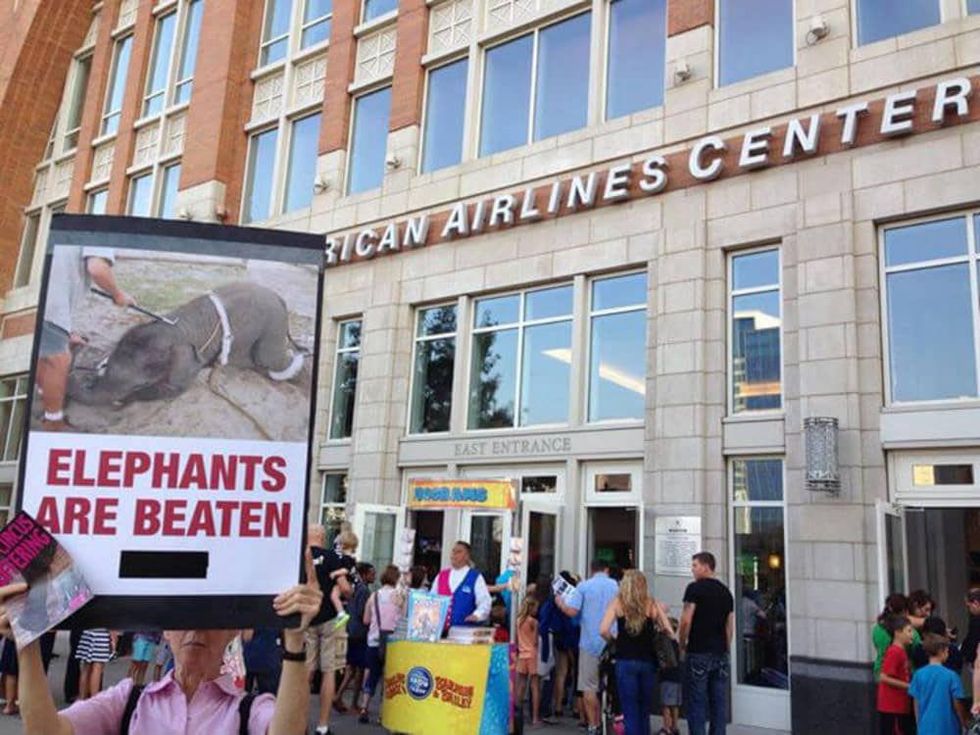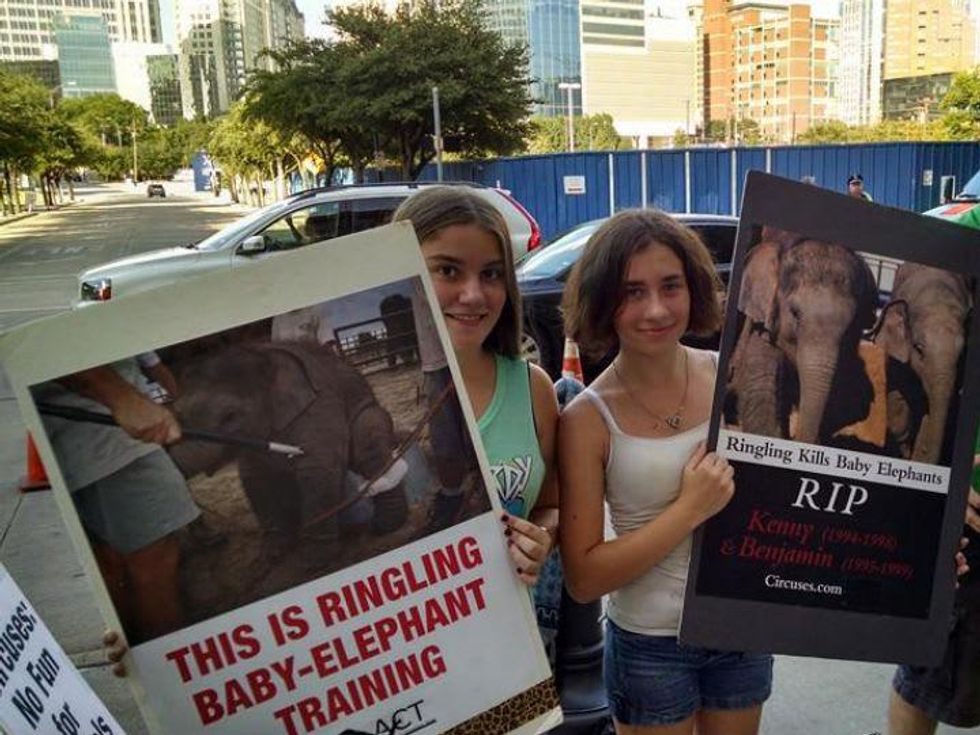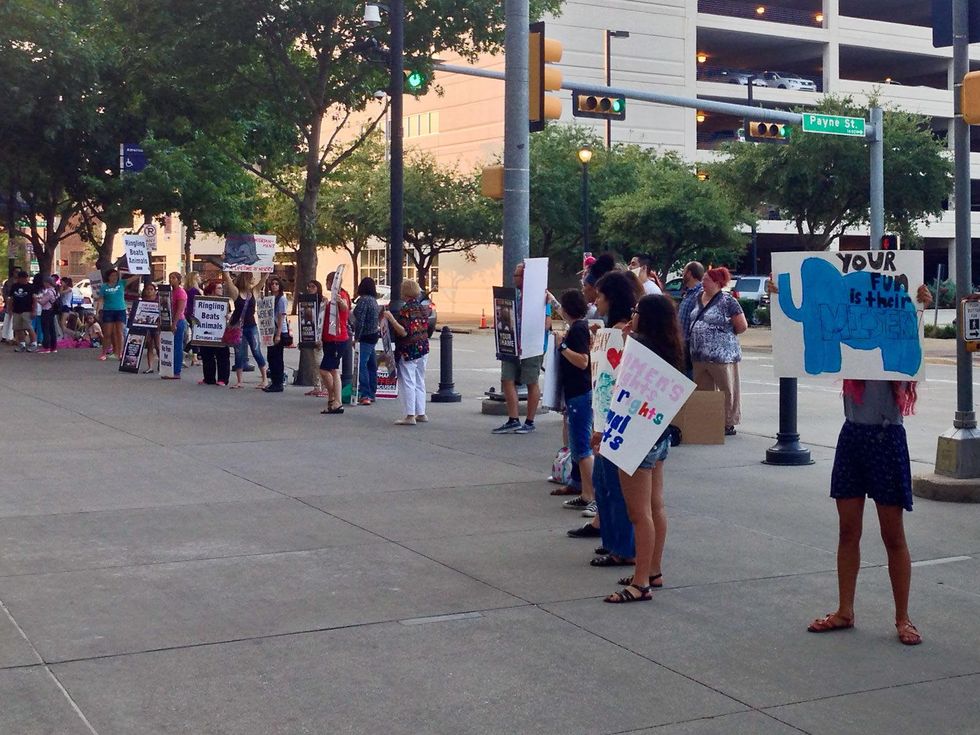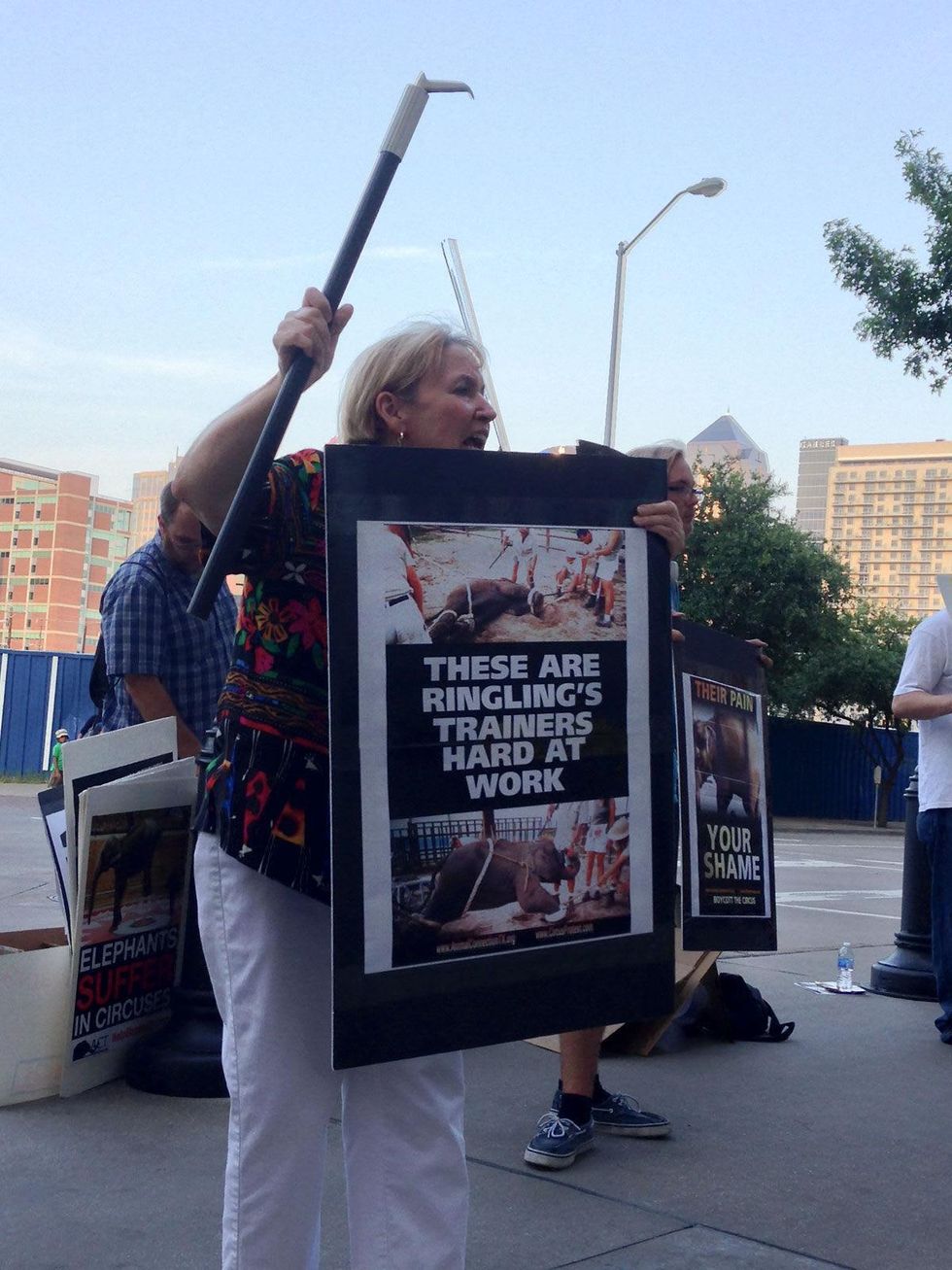Circus Under Attack
Ringling Bros. popularity plummets amid growing protests over animal cruelty
It's opening night for the Ringling Bros. and Barnum & Bailey Circus at American Airlines Center in Dallas, making its annual summer trek through Texas on this not-too-hot night on July 30. Two scraggly lines form at the entrance; turnout seems low.
At a booth by the door, a young employee in a brightly colored vest stacks up programs. Pacing nearby is a man in his 40s, in a comb-over and polyester suit; he's part of a small posse of Ringling suits on patrol.
Their attention is focused on a line of about 80 protesters on the sidewalk, stretching across the front of the venue, holding signs that read "Ringling beats animals" and "Boycott the circus." One protester uses a bullhorn. Every time she speaks, the guy with the programs tries to drown her out: "Get your program right here!" One suit mutters to another, "Boy, they're really out tonight."
Ringling has been met by protests in Dallas for years, just as in other cities. But the recent SeaWorld controversy has ignited more criticism.
The suits are not the only ones eyeing the protest group. Bicycle police officers straddle their bikes; two detectives stand next to an unmarked police car. The suits confer with the detectives. And then comes the police warning to the protesters: Stand back. No bullhorn.
"We have the right to have a bullhorn," says Savanna B., one of the organizers. "But the police presence has really increased in the past few years."
It's not the first year that Ringling has been met by protests in Dallas, nor in other cities. But the recent controversy over SeaWorld, whose treatment of animals has come under attack since the release of the documentary Blackfish, has ignited more criticism of the use of animals for entertainment, and the number of protesters has grown.
At the same time, companies that profit from the use or sale of animals have hastened to enact legislation protecting them from scrutiny. Some states now make it illegal to photograph or videotape at a factory that processes animals for food. A recent law called the Animal Enterprise Terrorism Act has been used to arrest protesters for doing nothing more than marking a street with chalk, distributing leaflets and protesting.
No one gets arrested at the circus in Dallas, but there are confrontations. When a petite protester recites how baby elephants are separated from their mothers and tied down to be immobile for days and even months, an aggressive guy in a buzzcut marches over and screams in her face, "Don't talk to my kids! You don't have the right to talk to my kids!"
Nearly 40 towns and cities in the United States and more than 30 countries have banned or restricted the use of animals in circuses.
A mother yells at the protesters, "How could you hold those signs in front of the children?"
It feels like a long time since 1985, when Neiman Marcus founder Stanley Marcus triumphantly rode an elephant for his 80th birthday and Ringling paraded 22 elephants, 30 horses, six zebras, four camels and two llamas through downtown Dallas to broadcast its arrival. Each year since then, the number has declined: 18 elephants in 1989, 14 elephants in 2000, down to no more than eight and sometimes only six today.
In search of new customers, the circus has cannily sought out partnerships where it can prey on children. During the '90s, they partnered with the Boys & Girls Clubs of Greater Dallas to guarantee a steady infusion. These days, the circus has gone to more desperate measures by hiring clowns to visit libraries in poor neighborhoods and hand out free tickets for kids, drumming up business two months before the big show arrives. The mainstream media is mostly complicit, with unreflective writers who dutifully add it to their entertainment picks list year in, year out.
Ringling's owner, Feld Entertainment, won a legal victory in May with a $15.75 million settlement, following a 14-year battle with animal groups over its treatment of its elephants. The animal groups lost because their key witness, a former employee, was found to have been paid to testify. But the animals lost because the settlement meant that the court never got to rule on the abuse issue. With the circus constantly on the move, it's hard to track its behavior or hold it accountable.
Nonetheless, nearly 40 towns and cities in the United States and more than 30 countries have banned or restricted the use of animals in circuses.
In April, Los Angeles banned the use of bullhooks, the sharp-edged tool used by Ringling trainers; in June, Mexico banned the use of animals entirely. A year-long investigation by Mother Jones found that Ringling elephants lead miserable lives, are afflicted by illnesses that the circus ignores, and that a number of elephants have died "under disturbing circumstances."
In the past few years, the circus has taken steps to shield the way it handles elephants, says Susan O., who has been protesting the circus for more than a decade.
"When it was at Reunion Arena, they'd walk the elephants to the train box cars when it was all over, and you could see how painful it was for the elephants to board," she says. "Many of them suffer arthritis and other debilitating conditions. But three years ago they stopped walking them, to get them out of public view. Now the elephants are trucked to the trains instead."
It's a transport that's heavily guarded, says Savanna. "In Dallas, the police are really out in force when they’re moving elephants," she says. "They won't let us anywhere near the tracks."
Not helping Ringling's prospects in Texas this year was the terrible accident in which a two-year-old girl fell from the stands and was hospitalized.
Not helping Ringling's prospects in Texas this year was the terrible accident in which a two-year-old girl fell from the stands and was hospitalized. On August 9, the circus' final Saturday night and its best shot at a blockbuster, less than half the seats were filled; traffic cops who would have been waving cars to the parking lot stood idle.
Groups across the country have organized a national weekend of action against the Animal Enterprise Terrorism Act (AETA) from September 5-7 with a goal of educating the public about federal laws that specifically target animal advocates, with an event being planned for Dallas, as well. A Facebook page has more information.
After Dallas, the circus packs up and heads to Fort Worth. The protesters are there with signs one night, and leaflets the next. On closing night, they try one last time to catch sight of the elephants as they're loaded onto the train for their next city; according to Wildlife Advocacy, the animals perform between 48-50 weeks each year, sometimes three performances in one day. They're "chained in box cars while traveling from town to town, chained all night long, and chained for most of the day." That's perhaps worse than SeaWorld. Or are the two equally villainous?
The protesters never do get access to the elephant loading in Fort Worth. But one circus-goer promises he won't come back, while another looks chastened, saying, "I didn't know." Small victories, and unfortunately there's always next year.




